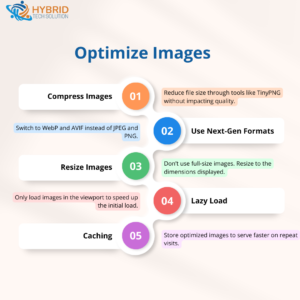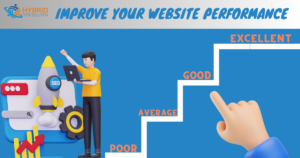Your website’s performance and speed are critical for providing users with a positive experience, boosting conversions, and enhancing SEO. If your website is slow, buggy, or unreliable, you are losing potential customers and revenue opportunities.
In this comprehensive guide, we’ll explore 10 powerful ways to optimize your website performance through site speed improvements, hosting and infrastructure upgrades, code optimizations, and advanced monitoring. Follow these tips to slash load times, boost uptime, and create a smooth, seamless experience for your site visitors.

1. Optimize Images
Images often make up the majority of a webpage’s size. Optimizing your images is one of the quickest ways to improve site speed and performance.
- Compress Images: Reduce file size through tools like TinyPNG without impacting quality.
- Use Next-Gen Formats: Switch to WebP and AVIF instead of JPEG and PNG.
- Resize Images: Don’t use full-size images. Resize to the dimensions displayed.
- Lazy Load: Only load images in the viewport to speed up the initial load.
- Caching: Store optimized images to serve faster on repeat visits.
2. Minify Resources
Minification removes whitespace, comments and unnecessary code to reduce HTML, CSS, and JavaScript file sizes. This minimizes the number of bytes sent over the wire.
Most content management systems and build tools like Webpack automatically minify during build. But double-check that resources are properly minified, especially third-party scripts.
3. Enable Compression
Compression shrinks resources like CSS, JS and images before sending them to browsers. This reduces transmission time.
Use gzip or Brotli compression on your web server. Test compression with tools like PageSpeed Insights.
4. Browser Caching
Browser caching stores resources locally on a user’s device so repeat page loads don’t need to re-download assets.
Set proper cache headers for resources like CSS and JS files. Version files like style.1.0.css to allow caching while updating.
5. Reduce Redirects
Each redirect requires an extra network request, which can noticeably lag page loads.
Avoid unnecessary redirects from links. Consolidate domains to prevent excessive redirects between domains.

6. Asynchronous Loading
Load crucial content like text and HTML first. Load non-essential items like images after to improve the initial load speed.
Prioritize above-the-fold content users see first. Load other assets asynchronously. this improves perceived performance.
7. Upgrade Hosting Infrastructure
If your hosting server is overloaded or underpowered, switch plans or providers for increased resources.
Look for fast processors, ample RAM and storage, CDN integration, and optimized software stacks on hosting plans.
8. Enable Caching Plugins
Caching plugins create static HTML copies of pages to return instead of dynamically generating them each time. This significantly accelerates repeat visits.
WP Rocket and W3 Total Cache are popular caching plugins. Varnish Cache also works for custom setups.
9. Monitor Performance
Continuously monitor website performance, speed and uptime using tools like Pingdom, Uptime Robot, and Google PageSpeed Insights.
Set performance budgets and get alerts when pages exceed thresholds. Proactively address degrading performance.
10. Tune Code and Database
Optimizing your backend code and database improves website performance.
Tune database queries, use efficient data structures and algorithms, and remove unnecessary queries.
By applying these performance best practices, you can significantly optimize your site’s speed and reliability. Faster-performing websites drive higher conversions, improve SEO, and delight users with smooth interactions.
Why Choose Hybrid Tech Solutions?
As Ireland’s top web design and development agency, Hybrid Tech Solution can expertly optimize your website’s performance. Here are a few key reasons to choose us:
- Performance Audits: We provide in-depth performance checks and recommendations.
- Site Speed Optimization: We implement proven speed optimization techniques.
- Web Vitals Tracking: We monitor core web vitals like LCP and FID.
- Code Optimization: Our expert developers fine-tune backend code and databases.
- Caching and Scaling: We get sites CDN and caching ready for traffic spikes.
- Technical Excellence: Our team specializes in modern web stack performance tuning.
- Support: We proactively monitor and maintain site performance every month.
Let Hybrid Tech Solution optimize your site for speed, scalability and user experience. Get in touch to get started!
FAQs About Improving Website Performance
1. What are some quick website performance wins?
Compressing images, enabling compression, and browser caching provide quick performance boosts.
2. How does minification improve website performance?
Removing whitespace and comments reduces file sizes, resulting in faster loading of resources.
3. What are the benefits of browser caching?
Browser caching stores files locally on repeat visits so resources don’t need re-downloading.
4. How does upgrading hosting help site performance?
More hosting resources like CPU, memory, storage, and bandwidth prevent bottlenecks.
5. How can you load pages faster with asynchronous techniques?
Loading above-the-fold content first improves initial load speed.
6. What are caching plugins and how do they help?
Caching plugins create static HTML pages to return instead of dynamic generation.
7. Why is continual monitoring important?
It allows you to catch performance regressions and address issues proactively.
8. What types of tools can you use to monitor site performance?
Pingdom, Uptime Robot, PageSpeed Insights, and Chrome DevTools are helpful.
9. What are website performance budgets?
Thresholds for speed metrics like page load times alert you if they are exceeded.
10. How can backend optimizations improve performance?
Tuning databases, queries, code, and algorithms speeds up processing and responses.









